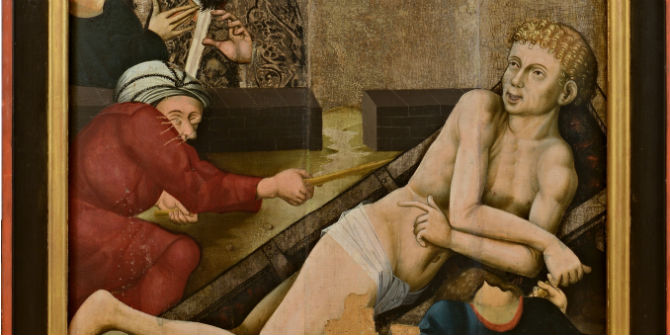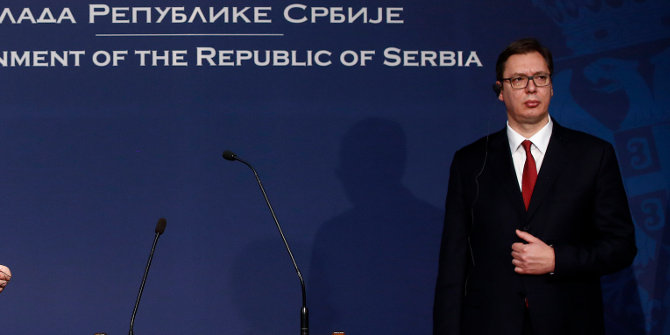 The president and prime minister of the Czech Republic are both Eurosceptics, and there has been speculation that the country might follow the UK out of the EU. But, argues Benjamin Whitlock, this overlooks a long history of cultivating a ‘European’ Czech identity, in which the country and its predecessors are placed firmly in a European intellectual tradition. This contrasts sharply with ingrained British Euroscepticism.
The president and prime minister of the Czech Republic are both Eurosceptics, and there has been speculation that the country might follow the UK out of the EU. But, argues Benjamin Whitlock, this overlooks a long history of cultivating a ‘European’ Czech identity, in which the country and its predecessors are placed firmly in a European intellectual tradition. This contrasts sharply with ingrained British Euroscepticism.
In January 2018, Miloš Zeman was re-elected President of the Czech Republic. The openly Eurosceptic and distinctly pro-Russia Zeman seems determined to continue his war of words with the European Union. Last autumn, the populist and anti-establishment ANO emerged as the largest party in the Chamber of Deputies. The rise to power of its leader, the new Prime Minister Andre Babis, bears a striking similarity to Donald Trump’s. Both are billionaire businessmen and managed to take the top job by running anti-establishment and anti-immigrant campaigns. Combine this with the fact that parliament is debating a new law making it easier to hold nationwide referendums, and a Czech exit from the EU looks increasingly plausible.
But those who confidently predict Czexit may be disappointed. As with the UK, there are clear economic disadvantages for the Czech Republic if it leaves the EU. But that alone would be unlikely to prevent a leave vote. Despite the relentless economic focus of the Remain campaign, economics was not the dominant factor in Britain’s Leave vote. Rather, identity appears to have been key – and it is how Czech identity relates to the idea of being ‘European’ that will shape the outcome of any Czexit referendum.

Writing in 2017, Nicholas Boyle showed how the 2016 referendum was the result of a sustained crisis of identity that Britain, and in particular England, had faced since the end of Empire. Unable to accept that it was no longer peerless, Britain opted to quit the EU rather than reconcile British identity with the cosmopolitan idea of Europe.
This is in stark contrast to the way Czech identity is constructed. Rather than deny its essentially European character, Czech civil society and the Czech government show a consistent desire to integrate their national story into that of cosmopolitan Europe. They seek to locate the Czech Republic and its medieval predecessor, the Kingdom of Bohemia, within European history, and major historical figures as Europeans.
Charles IV, Holy Roman Emperor and King of Bohemia, is described as the ‘Father of the Nation’ and voted the Greatest Czech of All Time; commentators are keen to stress his international reputation and his role as one of greatest Holy Roman Emperors. In 2016 the Czech Republic celebrated his 700th anniversary with a series of celebrations and museum exhibitions which highlighted the importance of Charles IV to the Czech national story and national identity. He, the Empire and by extension the Czech Republic, become an integral part of the story.
This idea of Czech national heroes playing a leading role in European history can also be seen in the way 13th-century cleric Jan Hus is presented. Hus achieved European-wide infamy due to his attacks on the Catholic church, gaining many followers (known as Hussites) and instituting reforms within the Bohemian church. He was burnt at the stake for heresy and became a national hero whose followers started the Hussite rebellion against the Catholic church and the Holy Roman Empire. While he is often presented as part of the battle for Czech independence, historians invariably mention his links to the English theologian John Wycliffe and how Martin Luther would draw on his writings a century later when he triggered the Protestant Reformation. (Luther said “We are all Hussites”.)
This desire to locate the Czech nation as an integral part of Europe is in no way a modern phenomenon. Rather, the integration of Charles IV and Hus into a wider European history began decades ago. After gaining independence from the Hapsburg monarchy in 1918, Czechoslovakian politicians and intellectuals engaged in a sustained debate on the international status of the new republic. Drawing on the fact that Czechoslovakia had been one of the victors of the First World War and on the reputation of certain historical figures, the debate centred on whether Czech-dominated Czechoslovakia should be considered genuinely European, alongside France, Britain and Germany. Surprisingly, the debate focussed not only on the claim that it possessed ‘European’ characteristics such as political and economic power, but also whether it needed to possess a colonial empire. Acquiring colonies was regarded as key to becoming a ‘grown up nation’.
These debates on the European character of Czechoslovakia came to an abrupt end with the Munich crisis of 1938. The subsequent occupation by Nazi Germany and the postwar Communist government suspended the debate on the European nature of Czech identity. But following the restoration of democracy in 1989, Czechs again began to look at how being Czech relates to being European. In the 1990s, this centred on EU membership and the idea of a ‘return to Europe’, picking up many of themes that had been abandoned in 1938.
The end of Communist rule and the transition to a free market economy revealed hidden tensions between the two halves of Czechoslovakia. For the Czechs, market liberalisation represented a return to the interwar period, and a reaffirmation of their capitalist golden age. Slovakia, which had experienced significant industrial development under the Communist planned economy, viewed liberalisation less favourably. Both populations greeted the breakup of Czechoslovakia with mixed feelings. But Czechs saw it as a way to increase the speed of economic reforms, geopolitically moving the new Czech Republic firmly towards the West and accelerating their ‘return to Europe’.
With the birth of the new republic, Czech nationhood and identity would be understood in civic as opposed to nationalist terms that centred on the country’s accession to the EU. The desire to gain entry to the ‘European club’ shaped the way Czechs viewed themselves, and the construction of a distinct Czech identity was caught up in the economic and political reform process. In 1995 Czechs’ identification with ‘Europe’ was ranked as the third highest of the countries surveyed, and significantly higher than many established EU members. While tensions between Czech and European identity did – and continue to – exist, the Republic’s accession to the EU in 2004 was seen positively by the majority of Czechs.
Today Czechs continue to debate the relationship between Czech and European identity. However, the two are not generally presented as being incompatible. Czech schoolchildren study both Charles IV and Jan Hus and place them into a wider European context. The experience of the UK referendum suggests that future membership referendums are likely to be emotional affairs based on how people understand their identity. Those hoping for Czexit would do well to remember that Czech identity has arched towards being European for decades, if not centuries.
Please read our comments policy before commenting.
Note: This article first appeared at our sister site, LSE Brexit. It gives the views of the author, not the position of EUROPP – European Politics and Policy or the London School of Economics.
_________________________________
 Benjamin Whitlock – University of Aberdeen
Benjamin Whitlock – University of Aberdeen
Benjamin Whitlock is a doctoral student at the University of Aberdeen researching supranational government in the EU, the Austro-Hungarian Empire and the British Commonwealth in the interwar period.




Leaving EU is not leaving Europe
I wish the debates of Czech identity would be rooted in the European intellectual history.Yet, it is totally dominated by the current affairs, with being anti-Muslim and anti-migrant among the most uniting sentiments (despite absence of both migrants and Muslims in the country). Surveys show that Czechs are very pro-European in a sense of believing that close cooperation among 500,000,000 people is possible. However, when 50,000 eurocrats in Brussels get mentioned, the balance of opinion swings drastically to the anti-EU extreme. The Czexit referendum would be very, very close call.
Zdenek, perhaps Czech are intelligent enough to learn from the undeniable experience with migrants and Muslims in countries like, France, Germany, Sweden, Austria, Denmark, Holland, Belgium, Greece, Italy, Spain to mention some 😉 Compare the life in these countries before and after the arrival of these groups of people…and you do not need hundreds of thousands of believers in Islam before your country becomes unrecognizable as a place where people live in peace, mutual respect and acceptance…By the way Muslims are present in the Czech Rep. in case you have not noticed. Would you like to inform yourself about some of the issues that already arose because of them despite their “absence’ as you pot it?
” As with the UK, there are clear economic disadvantages for the Czech Republic if it leaves the EU…”
This is not a statement of fact but subjective opinion.
In the UK it is a fact that our trade is becoming more global and less European, with mass shipping and the internet, cold war protective trade unions are becoming irrelevant. The political benefits or freedom as opposed to been a small part of an European federal empire are debatable.
What is not debatable is the enormous economic benefits for people in the UK of leaving the EU. These economic benefits come from opening up the UK to global trade as we become free of the protective anti-trade EU.
It may be that Czech may not gain as many economic benefits as the UK as it does not have the same history of global trading, mass shipping, banking and air travel.
Excellent article Mr. Whitlock. It took me, as an American, four years of living in the Czech Republic (and nearly one year in Slovakia) to realize this. You summed it up very nicely. The most heated conversations I’ve had with Czechs springs from their identity and, from my perspictive, a struggle with years of “lost” identity during communism during which their character struggled to break through in the arts (thus, Vaclav Havel). Czechs realize their great potential and, perhaps, consider what could have been if all the powerful nations around them did not use them as a playing ground. And that’s the root of their Euroskepticism, more than their “Christian identity” playing in the background: is Brussels just another power in control deciding their future, a flashback to Neville Chamberlain and years of German cultural (and literal) invasion.
This is truly a remarkably accurate analysis, Ben. Also the comment above is spot on!